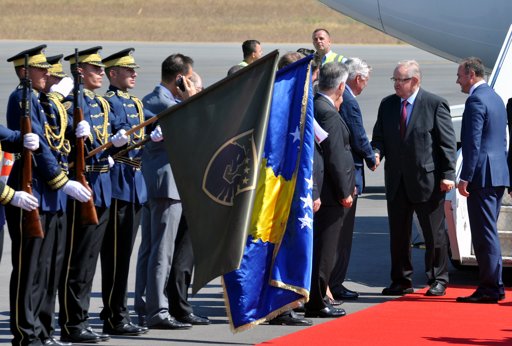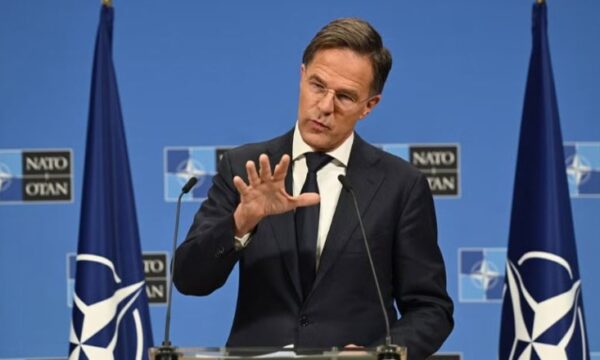 Western powers overseeing Kosovo have announced the end of their supervision of the tiny Balkan nation.
Western powers overseeing Kosovo have announced the end of their supervision of the tiny Balkan nation.Kosovo had been overseen by a group made up of 23 EU countries, the US and Turkey since 2008, when it unilaterally declared independence from Serbia.
US President Barack Obama said Monday marked a “historic milestone” for Kosovo, which he said had made “significant progress”. But Serbia dismissed the sovereignty announcement as meaningless. It does not recognise the secession of Kosovo and regards it as part of Serbia.
“The supervision of Kosovo is finished,” Dutch diplomat Pieter Feith, the highest international representative in Kosovo, told a press conference.
“The International Steering Group has decided to end the period of [Kosovo’s] supervised independence,” he said, speaking in Albanian.
Turnaround
Kosovan Prime Minister Hashim Thaci called the decision a “historic turnaround” for the state.
“This is an international success for Kosovo which confirms that the international community respects Kosovo,” he said.
He acknowledged that there was still work to be done, above all integrating the Serb majority in northern Kosovo, which is out of the ethnic-Albanian government’s control.
A Nato-led peacekeeping force in charge of security and a European mission on the rule of law will continue to operate in the country.
But Mr Obama said that the state had already made great strides.
“With the optimism, energy and determination characteristic of its people, Kosovo has made significant progress in solidifying the gains of independence and in building the institutions of a modern, multi-ethnic, inclusive and democratic state,” he said.
More than 90 countries, including the US and most of the EU, have recognised Kosovo.
However many others, such as Russia, Georgia and China, have refused to do so. Some fear encouraging secessionist movements in their own countries.
Serbian Prime Minister Ivica Dacic stressed Belgrade would never recognise Kosovo’s independence “supervised or unsupervised”, and dismissed the decision as meaningless.
Supervision of Kosovo ends, but what does it mean?
PRISTINA, Kosovo—Monday marked an important milestone for tiny Kosovo, as a 25-nation group formally ends supervision of the young country it has guided since the former Serbian province declared independence after a bloody war. It is a sign of confidence that the new country has matured enough since 2008 to take its destiny into its own hands.
But, in reality, very little will be different for the Balkan nation after the parliamentary ceremony celebrating the change. NATO-led peacekeepers will stay in charge of security and an EU mission will still have a final say in legal matters. Tensions with Serbia and ethnic Serbs living in the tense north will persist and so will the hardship of Kosovo’s army of jobless people who are still waiting to see the bright future they were promised.
WHAT DOES KOSOVO LOOK LIKE?
Kosovo is a small, landlocked territory in southeastern Europe, squeezed between Albania, Macedonia, Montenegro and Serbia. About 2 million people live there, predominantly ethnic Albanians of Muslim faith, while the rest are Orthodox Christian Serbs and other ethnic communities. Kosovo has some stunning nature, particularly in the west.
WHEN DID IT ALL START?
The Serb-Albanian dispute over Kosovo dates back decades, if not centuries. Serbia has sought to control the territory it views as a national heartland, while ethnic Albanians have always wanted to be on their own. In the former Yugoslavia, Kosovo was an autonomous region within Serbia until 1989 when nationalists in Belgrade revoked self-rule. Tensions simmered until 1998 and then exploded in bloody conflict.
WHAT HAPPENED DURING THE CONFLICT?
Serbia’s nationalist leader Slobodan Milosevic responded with brutal force to an ethnic Albanian rebellion, killing civilians and wiping out entire villages. Led by the United States, NATO intervened in March 1999, unleashing a 78-day bombing campaign that finally forced Milosevic to pull out from Kosovo and allow NATO to move in. About 10,000 people died in the war and many crimes were committed.
WHAT HAPPENED AFTER THE WAR?
After the war in 1998-99, Kosovo freed itself from Serbia’s rule, but did not immediately gain statehood. Kosovo actually declared independence almost a decade later, in 2008. It was backed by the United States and most EU nations, but not Serbia, which vowed never to recognize the split. That is when 25 nations—the U.S., Turkey and EU countries—set up the International Civilian Office to monitor Kosovo’s democratic process during the so-called “supervised independence” period. Serbia, with the help of its allies, primarily Russia, has managed to block Kosovo from achieving full sovereignty and Kosovo has not become a member of the United Nations, although it has established diplomatic ties with 89 states.
WHAT DOES THAT LOOK LIKE IN REAL LIFE?
This means that Kosovo has an anthem and a flag, but that its flag has not been hoisted in front of the U.N. seat in New York. It is also not allowed to participate in the Olympics or international events on its own, so some athletes have joined the team of neighboring Albania. Most recently, Kosovo tried to change its telephone prefix from the one it shares with Serbia but was refused on the grounds that only U.N. member states can have a code of their own.
IS THERE STILL THREAT OF WAR?
An all-out war is unlikely, but Kosovo remains tense and there are occasional violent incidents, particularly in the Serb-dominated north, where the central government has little authority. Another threat to Kosovo stability is widespread corruption and organized crime.
WHAT NEXT?
The European Union hopes Kosovo and Serbia will gradually work out the dispute lured by the prospects of membership in the bloc. There has been some progress, so Kosovo citizens can now travel to Serbia with their own ID card, but not with Kosovo car plates. Serbia has agreed to accept Kosovo university diplomas if they are certified by a third party, but won’t sit at regional meeting alongside a Kosovo delegation unless there is an asterisk on the Kosovo name that refers to a note about its international position.
Kosovo’s prime minister Hashim Thaci says, “much remains to be done, but the state of Kosovo is being consolidated and strengthened every day.”
















